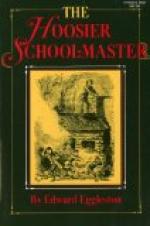“Well, good-by, ole woman,” said Pearson, as he took up his little handkerchief full of things and started for his hiding-place; “good-by. I didn’t never think I’d desart you, and ef the old flintlock hadn’t a been rusty, I’d a staid and died right here by the ole cabin. But I reckon ’ta’n’t best to be brash[22].” And Shocky looked after him, as he hobbled away over the stones, more than ever convinced that God had forgotten all about things on Flat Creek. He gravely expressed his opinion to the master the next day.
FOOTNOTES:
[Footnote 22: The elaborate etymological treatment of this word in its various forms in our best dictionary is a fine illustration of the fact that something more than scholarship is needed for penetrating the mysteries of current folk-speech. Brash—often bresh—in the sense of refuse boughs of trees, is only another form of brush; the two are used as one word by the people. Brash in the sense of brittle has no conscious connection with the noun in popular usage, but it is accounted by the people the same word as brash in the sense of rash or impetuous. The suggestion in the Century Dictionary that the words spelled brash are of modern formation violates the soundest canon of antiquarian research, which is that a word phrase or custom widely diffused among plain or rustic people is of necessity of ancient origin. Now brash, the adjective, exists in both senses in two or three of the most widely separated dialects of the United States, and hence must have come from England. Indeed, it appears in Wright’s Dictionary of Provincial English in precisely the sense it has in the text.]
CHAPTER XVIII.
ODDS AND ENDS.
The Spring-in-rock, or, as it was sometimes, by a curious perversion, called, the “rock-in-spring,” was a spring running out of a cave-like fissure in a high limestone cliff. Here the old man sheltered himself on that dreary Christmas evening, until Bud brought his roan colt to the top of the cliff above, and he and Ralph helped the old man up the cliff and into the saddle. Ralph went back to bed, but Bud, who was only too eager to put in his best licks, walked by the side of old John Pearson the six miles over to Buckeye Run, and at last, after eleven o’clock, he deposited him in a hollow sycamore by the road, there to wait the coming of the mail-wagon that would carry him into Jackson County.
“Good-by,” said the basket-maker, as Bud mounted the colt to return. “Ef I’m wanted jest send me word, and I’ll make a forrard movement any time. I don’t like this ’ere thing of running off in the night-time. But I reckon General Winfield Scott would a ordered a retreat ef he’d a been in my shoes. I’m lots obleeged to you. Akordin’ to my tell, we’re all of us selfish in everything; but I’ll be dog-on’d ef I don’t believe you and one or two more is exceptions.”




